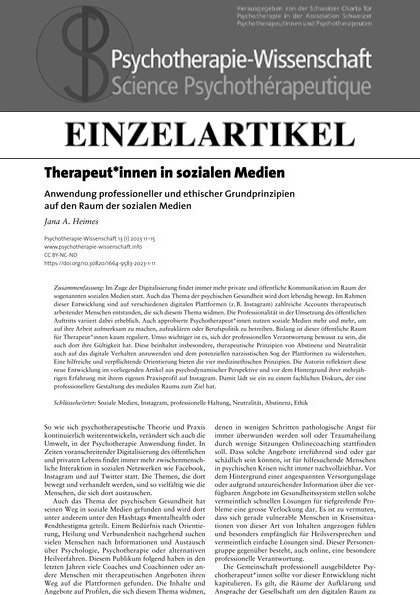Therapists in social media
Applying professional and ethical principles to the social media space
DOI:
https://doi.org/10.30820/1664-9583-2023-1-11Keywords:
social media, Instagram, professional stance, neutrality, abstinence, ethicsAbstract
In the context of digitalization, more and more private and public communication takes place in the space of so-called social media. The topic of mental health is also vividly moved there. In the context of this development, numerous accounts of therapeutically working people have emerged on various digital platforms (e. g. Instagram), which are dedicated to this topic. The professionalism in the implementation of the public appearance varies considerably. Licensed psychotherapists are also using social media more and more to draw attention to their work, to educate or to pursue professional politics. So far, this public space for therapists has hardly been regulated. It is therefore all the more important to be aware of the professional responsibility that also applies there. This includes, in particular, applying therapeutic principles of abstinence and neutrality to digital behavior and resisting the potential narcissistic pull of the platforms. The four medical ethical principles offer a helpful and obligatory orientation. In this article, the author reflects on this new development from a psychodynamic perspective and against the background of her several years of experience with her own practice profile on Instagram. In doing so, she invites a professional discourse aimed at a more professional design of the media space.
Downloads
How to Cite
Heimes, J. A. (2023). Therapists in social media: Applying professional and ethical principles to the social media space. Psychotherapie-Wissenschaft, 13(1), 11–15. https://doi.org/10.30820/1664-9583-2023-1-11
Issue
Section
Special Issue
License

This work is licensed under a Creative Commons Attribution-NonCommercial-NoDerivatives 3.0 Unported License.
This journal provides open access to its content in accordance with the basic premise that the free public availability of research benefits the exchange of knowledge throughout the world.
Authors wishing to publish in this journal agree to the following:
- The author/s retain/s the copyrights and consent/s to initial publication of the work in the journal under a Creative Commons Attribution licence, which allows third parties to use the work by citing the name/s of the author/s and this journal as initial publisher (in accordance with the Creative Commons Attribution-NonCommercial-NoDerivs 3.0 DE-Licence).
- The author/s can enter into additional contracts for the non-exclusive distribution (e.g. publish in a collection or book) of the version published in the journal, if the journal is cited as initial publisher.


